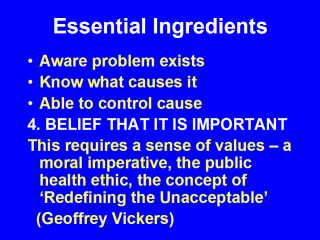 |
4. The belief
(sense of values) that the problem is important: This is an essential
prerequisite to determination to do something about it. It is the most
fascinating and challenging aspect of the essential features. It is the
moral imperative that drives public health reforms. Geoffrey Vickers
described the history of public health as a process of redefining the
unacceptable – an endless process of identifying conditions, behaviours,
circumstances, that individuals, communities, cultures, must no longer
tolerate. Throwing the contents of the chamber pot into the street, clearing
one’s nostrils on the tablecloth, coughing and spitting on the living-room
floor, became unacceptable in the late 19th century. Many beyond the
boundaries of medical science and public health practice played a role in
this process. In the era of the great reforms of the 19th century, they
included social reformers like Edwin Chadwick, journalists like Henry Mayhew
and Charles Kingsley, novelists like Charles Dickens, cartoonists in
Punch and other periodicals – all of them aided by the rise of literacy
in those times. Collectively they inspired a mood of public outrage that
became an irresistible force for reform.
|
